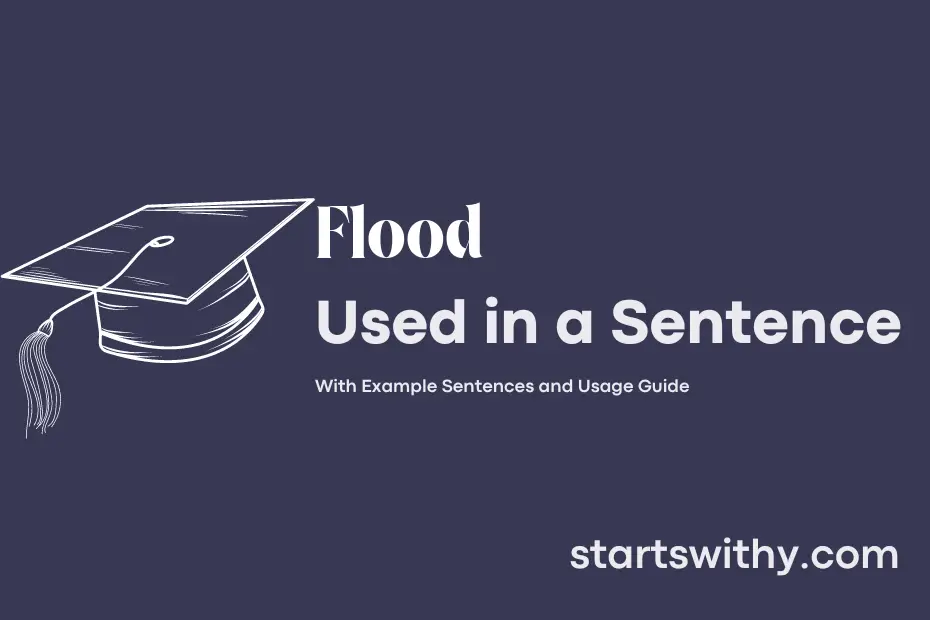Have you ever wondered how to properly use the word “flood” in a sentence? Let’s delve into its meaning and correct usage.
“Flood” is a noun and verb that refers to an overflowing of water onto land that is usually dry. As a verb, it can also mean to overwhelm someone or something with a large quantity of things.
7 Examples Of Flood Used In a Sentence For Kids
- The flood washed away the houses.
- The flood made the streets very wet.
- We must stay safe during a flood.
- The flood filled the fields with water.
- The flood can be very dangerous.
- The flood carried away the boats.
- Our house was damaged by the flood.
14 Sentences with Flood Examples
- Flood warnings have been issued for low-lying areas, so be cautious when traveling during the monsoon season.
- It’s important to stay updated on weather forecasts to anticipate floods in your area.
- Make sure to keep emergency supplies handy in case of a sudden flood.
- The heavy rainfall is causing a flood in the streets, so it’s best to avoid driving in affected areas.
- Due to the flood, classes have been canceled until further notice.
- The flood damaged many parts of the campus, leading to temporary closures of certain buildings.
- Students were advised to evacuate the dormitories as a precautionary measure against the flood.
- The students volunteered to help distribute supplies to those affected by the flood.
- Exam schedules may need to be adjusted due to the recent flood situation in the city.
- The college is working on implementing better flood management strategies to prevent future damage.
- It’s important to raise awareness about the impact of floods on communities and the environment.
- The students organized a fundraiser to support families who lost their homes in the flood.
- The college offers counseling services for students who may be feeling overwhelmed by the recent flood events.
- Don’t take unnecessary risks during a flood – always prioritize your safety first.
How To Use Flood in Sentences?
Flood is a noun that refers to an overflow of water that submerges land, often causing damage. When using the word “flood” in a sentence, it is essential to ensure clarity and accuracy in your communication. Here are some tips on how to effectively use flood in a sentence:
-
Subject-Verb Agreement: Make sure that the subject matches the verb when using flood in a sentence. For example, “The heavy rain flooded the streets” uses the correct verb form for the subject “rain.”
-
Context: Provide enough context in your sentence to indicate whether flood is being used as a physical event or a metaphorical expression. For instance, “Her emotions flooded her thoughts” uses flood metaphorically to describe overwhelming emotions.
-
Punctuation: When writing about a flood as a natural disaster, it is helpful to use descriptive language and appropriate punctuation to convey the intensity of the event. For example, “The river flooded, destroying homes and roads in its path!”
-
Clarity: Be clear in your use of flood to ensure that the meaning of your sentence is easily understood. Avoid using flood in ambiguous ways that could confuse the reader.
Remember, using flood in a sentence requires attention to detail and the ability to convey meaning accurately. Practice using flood in different contexts to improve your writing skills.
Conclusion
In conclusion, the sentences with the keyword “flood” demonstrate the devastating impact of such natural disasters on communities and the environment. From describing homes being destroyed to people being displaced, these sentences vividly illustrate the chaos and destruction caused by floods. Additionally, they emphasize the importance of being prepared and taking preventive measures to mitigate the effects of flooding.
By reading these sentences, one can appreciate the urgency of addressing climate change and investing in infrastructure that can withstand extreme weather events like floods. Furthermore, these examples serve as a reminder of the resilience and strength of individuals and communities who work together to recover and rebuild after experiencing the catastrophic consequences of a flood.



